What's Happening?
A federal tax credit for electric vehicles, offering up to $7,500, is set to expire on September 30. This impending deadline has led to a surge in consumer demand for electric vehicles (EVs), as reported by car shopping experts. The expiration date was moved up from its original 2032 deadline as part of a tax bill signed into law in July. According to Cars.com, demand for new EVs has increased by 33% compared to the same period last year, while demand for used EVs has risen by 22%. The federal credit is a significant factor influencing consumer decisions, with nearly three-fourths of surveyed consumers citing it as a major or contributing factor in their decision to purchase an EV.
Why It's Important?
The expiration of the federal EV tax credit could have a substantial impact on the electric vehicle market in the U.S. Analysts predict a potential drop in EV sales once the incentive is no longer available, which could slow the adoption of EVs. The tax credit has been instrumental in making EVs more affordable, and its removal might deter consumers from purchasing these vehicles, especially given their higher price compared to gasoline-powered cars. Automakers like Ford are responding by developing new production systems to bring lower-cost EVs to market, aiming to maintain competitiveness and affordability in the absence of federal incentives.
What's Next?
As the deadline approaches, consumers are expected to continue rushing to secure the tax credit, potentially leading to a temporary spike in EV sales. However, once the credit expires, industry experts anticipate a significant slowdown in sales. Automakers and dealers may need to rely on state and local incentives to maintain sales momentum. Additionally, automakers are likely to introduce new models at lower price points to attract buyers, as seen with Ford's plans to launch a midsize electric pickup in 2027.
Beyond the Headlines
The expiration of the tax credit could lead to broader discussions on the role of government incentives in promoting sustainable technologies. It may also prompt automakers to innovate and reduce costs independently, potentially leading to advancements in EV technology and production efficiency. The shift in consumer behavior could influence future policy decisions regarding environmental incentives and the transition to cleaner energy sources.











